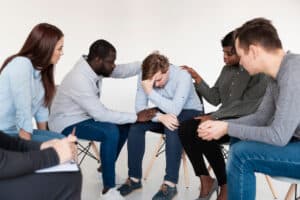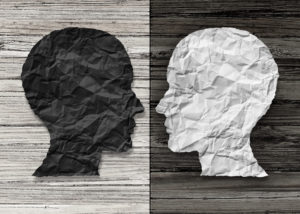Drug addiction and depression are common among both adults and adolescents throughout the United States, and sadly, the disorders often co-occur. If you’re wondering how to help someone with drug addiction and depression, Northbound Treatment is here to assist.
Co-occurring substance abuse and mental illness should be addressed by a team of experts as part of a comprehensive rehab plan. If your loved one is 18 or older, they’ll have to willingly agree to get treatment at a rehabilitation center, but there are some things you can do to help get them on the right path.
Understanding the Link Between Depression and Drug Abuse
According to the 2018 National Survey on Drug Use and Health, substance use is more common among people who struggle with mental health issues or require mental health support. Around 50% of adults with a severe mental illness (including major depressive disorder) have used illegal drugs within the last year. This is substantially higher than people without a mental health condition, only 15% of whom used illicit drugs in the past year1.
In 2018, one out of every seven adolescents between the ages of 12 and 17 had a major depressive episode. About 13% of young adults between the ages of 18 and 25 experienced an episode of major depression. Nearly 20% of people with substance abuse disorder (SUD) are also clinically depressed, pointing to a clear link between depression and drug abuse1.
It’s not always evident whether an individual’s addiction or depression occurred first, and the symptoms of each condition can be very similar2. In some cases, substance abuse is a coping mechanism for someone battling severe depression. In other instances, a person can become depressed as a result of their drug addiction, as a dependency can wreak havoc on virtually every facet of their life. For more articles discussing the link between depression and addiction, how depression and substance abuse connect, and how to help someone with depression and alcohol abuse, head over to our informative blog.
Knowing the Signs and Symptoms of Depression and Drug Addiction
Your loved one might have already acknowledged that they’re suffering from drug addiction and depression and may have been diagnosed with either condition. However, if you’re concerned about their mental health and problematic behaviors but aren’t entirely sure what’s going on, knowing the signs of both conditions is the first step in helping them.
Depression is a common mental health condition, and yet nearly everyone has bad days and feels sad from time to time. That’s why it’s important to know the difference between normal sadness and grief — which are usually brief — and clinical depression. For example, when a loved one passes away, it’s normal to grieve the loss. That being said, a person who grieves for a prolonged period or is incapacitated by loss may be depressed.
The most common signs and symptoms of depression include:
- Disinterest in previously enjoyable activities
- Lethargy and low energy
- Frequent crying
- General apathy
- Increase or decrease in appetite
- Weight loss or gain
- Sleeping more or less than usual
- Withdrawing from friends and family
- Difficulty showing up to work or other obligations
- Increased substance use
If your family member, partner, or close friend exhibits some of these symptoms or behaviors, there’s a good chance they’re facing depression. Since depression can be chronic, early detection and prompt treatment can help prevent ongoing or worsening turmoil.
The most common signs and symptoms of drug addiction include:
- Abnormal drowsiness or lethargy
- Small “pinpoint” pupils or bloodshot eyes
- Slow breathing
- Agitation or paranoia
- Uncharacteristic outbursts
- Frequent confusion or disorientation
- Slow-than-normal speech patterns or reaction times
- Sleeping more or less than usual
- Disinterest in previously enjoyable activities
- Secretive behaviors
- Weight loss and decreased appetite
- Withdrawing from friends and family
- Difficulty showing up to work or other obligations
As you can see, some depressive symptoms and signs of drug abuse overlap, including appetite loss, weight loss, changing sleep patterns, work troubles, withdrawing from loved ones, and a disinterest in previously enjoyable activities.
Devastatingly, untreated co-occurring disorders (sometimes called “comorbidity“) can end up intensifying these symptoms and behaviors, leading to deeper depression and severe drug addiction3. Many individuals with SUD are reluctant to admit (to themselves and others) that they have a problem. However, knowing what to look for can help you address the problem and ultimately guide them to get treatment.
Confronting Someone Struggling with Drugs and Depression
If your loved one shows signs of substance abuse disorder and depression, the next step is confronting them. The main thing to keep in mind is to avoid making them feel “ambushed.” Family interventions can be effective, but they’re usually a last resort. Try a one-on-one conversation before taking any action, and be sure to communicate that your concerns come from a loving place.
Let your loved one know you care about them, that you don’t like seeing them suffer, and that your goal is not to shame them but to help them get integrated treatment for their substance abuse problem and clinical depression. Then give them a chance to respond and share their own concerns, fears, or obstacles in the way of their recovery.
Consulting with an addiction specialist who has experience with co-occurring mental health disorders can be helpful. A specialist will have experience with interventions, and they’ll know how to help someone with drug addiction and depression. They can guide you through the ins and outs of a confrontation so you know what to expect and how to best prepare.
Northbound Treatment is here for our clients and their families at every step of the journey to recovery. Our drug rehab programs often begin with an inquiry from a concerned family member. When you call or email us, an experienced addiction specialist can walk you through the process of confronting your loved one and helping them start treatment.
Guiding Your Loved One to the Right Treatment Program
Whether it’s a family intervention or a one-on-one conversation, we strongly recommend being ready to present your loved one with treatment options. With co-occurring disorders at play, you’ll want to look for a rehab center equipped to address drug addiction and depression simultaneously, like Northbound Treatment’s facilities in Orange County.
Research various treatment centers and call around to see which are able to admit your family member either the following day or very soon after. Confirming insurance coverage and payment options can also help streamline the process. If they’re receptive to your concerns and agree to get help, this can minimize the time between your meeting and checking in to a treatment center.
The Importance of Dual Diagnosis Treatment
In 2018, 51% of adults with substance abuse disorder and a co-occurring mental illness were treated for only one of the conditions, and 48% were treated for neither. That only leaves 1% who received treatment for both disorders (dual diagnosis treatment)1. Considering close to half of those with SUD also suffer from a mental health condition, the lack of proper care is a serious public health concern2.
Though more treatment facilities now offer dual diagnosis programs, many are still ill-equipped to address co-occurring disorders. Treating one without the other can be unproductive, as depression and addiction tend to feed into each other. Ultimately, this can lead to a worsened psychological state and increase the chances of relapse. Northbound is proud to offer comprehensive dual diagnosis treatment plans for depression and drug addiction, along with many other co-occurring conditions.
Dual Diagnosis Treatment for Drug Abuse and Depression
Here at Northbound, we recognize the complexity of mental illness and addiction, and we never ignore the link between the two. Each of our clients undergoes an initial assessment, during which our addiction treatment specialists evaluate their physical and mental health, history with substance abuse, and any previous diagnoses. We also talk to them about their lifestyle, living situation, family, fears, emotional struggles, and goals. Then we work with our clients to develop an individualized treatment plan that takes into account both their mental health and substance abuse.
When they begin rehab at our treatment centers, your loved one will be assigned a dedicated care team, which will likely include clinicians, nurses, an addiction coach, a therapist, a group counselor, and a case manager. This care team will work together to help your family member determine the root causes of their addiction and depression. Ultimately, dual diagnosis clients develop tools and strategies to identify triggers, cope without drugs, and live happy, content lives.
Dual diagnosis treatment is part of the full continuum of care we offer at Northbound. Our Orange County rehab centers are equipped to provide care at every stage of recovery, including detox, inpatient treatment, outpatient treatment, and ongoing addiction support.
If your loved one suffers from depression and drug addiction, we’re here to help. Call us today at (888) 978-8649.
External sources:
2. https://www.drugabuse.gov/drug-topics/health-consequences-drug-misuse/mental-health-effects











